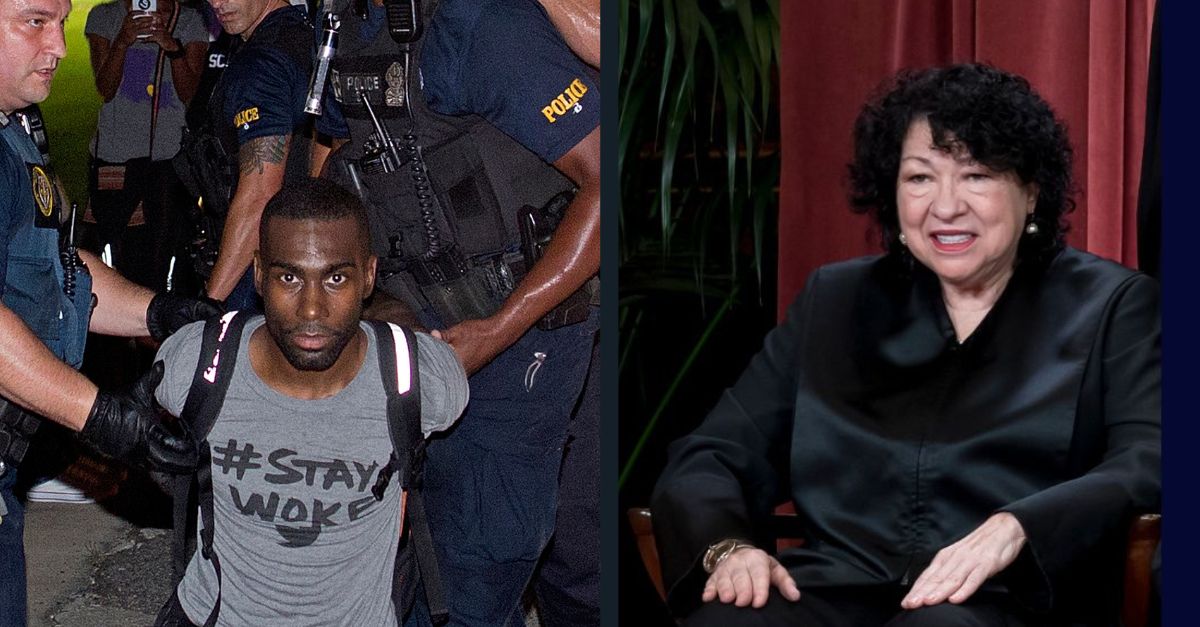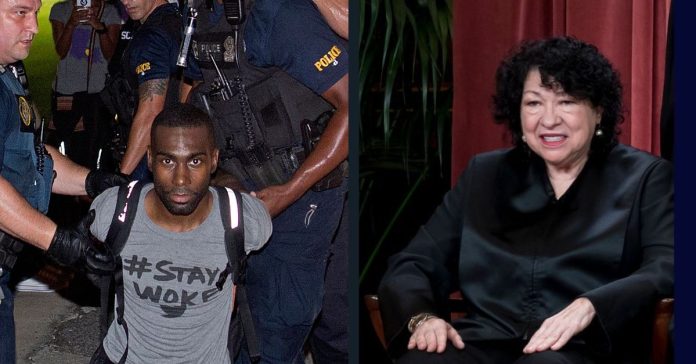
Left: FILE – In this July 9, 2016, file photo, police officers arrest DeRay Mckesson for blocking Airline Highway during a protest in Baton Rouge, La. (AP Photo/Max Becherer, File); Right: U.S. Supreme Court Justice Sonia Sotomayor (Erin Schaff-Pool/Getty Images).
U.S. Supreme Court Justice Sonia Sotomayor fired a warning shot to the Louisiana Supreme Court on Monday when she penned a five-paragraph statement reminding it that the First Amendment protects even careless speech.
The Supreme Court denied certiorari Monday in the case of DeRay Mckesson v. John Doe, a case between an injured police officer and a Black Lives Matter (BLM) protester.
BLM activist DeRay Mckesson organized a demonstration in 2016 in Baton Rouge, Louisiana, to protest a shooting by a local police officer. Conflict broke out during the protest and Officer Nick Tullier, identified as “Officer Doe” in the pleadings, was hit in the face with a “piece of concrete or a similar rock-like object.” Tullier suffered serious injuries, including brain trauma and the loss of teeth. Although Tullier was clear that Mckesson was not the person who threw the object, he sued Mckesson and BLM as an organization, arguing that Mckesson “should have known” that the protest would become violent. The person who actually threw the object has never been identified.
The District Court of the Middle District of Louisiana dismissed Tullier’s lawsuit in 2017 as barred by the First Amendment, reasoning that protesters and leaders cannot be held liable for the violent acts of a third party unless they specifically intended or personally “authorized, directed, or ratified” that violence. The court also dismissed claims against BLM on the basis that the organization was not sufficiently structured to warrant defending lawsuits.
The U.S. Court of Appeals for the Fifth Circuit, the nation’s most conservative appeals court, reversed the district court’s ruling and said Mckesson could be held liable for “negligent protest.”
The case was legally chaotic. A three-judge panel of the Fifth Circuit issued three separate opinions in the case: one on April 24, 2019, before the court heard any oral argument, a revised opinion on Aug. 8, 2019 after Mckesson requested rehearing, and a third opinion on Dec. 16, 2019. Notably, when the case was decided for a third time, one judge, Donald Trump appointee Don Willett, dissented from the majority ruling although Willet had joined the first two versions of the opinion in full.
After the third panel opinion, Mckesson requested a full en banc hearing by all sixteen judges of the Fifth Circuit. However, the vote to rehear fell short by one when only eight of the sixteen judges voted for an en banc rehearing. On Nov. 2, 2020, the U.S. Supreme Court vacated the Fifth Circuit’s opinion in a scathing ruling that chastised the appeals court for mishandling the case and making illogical legal conclusions. The justices said the question of whether a protest organizer could be held liable for injuries an officer sustains during a protest is one the Supreme Court of Louisiana must answer while applying state law.
Over a year later, on March 25, 2022, the Supreme Court of Louisiana ruled that Doe’s claim against Mckesson could indeed proceed as a matter of state law. Thereafter, however, the Fifth Circuit still had an issue with which to grapple in the case: does the First Amendment preclude a lawsuit against a protester who acted as Mckesson did?
The same divided panel of the appeals court ruled that the First Amendment does not protect Mckesson from negligence liability. Willett dissented yet again. Just two weeks after the Fifth Circuit ruled against Mckesson, the Supreme Court handed down a ruling in another case that appeared to support the BLM protester’s free speech argument.
The high court ruled 7-2 that convicted stalker Billy Raymond Counterman was protected by the First Amendment for sending over a thousand “creepy” Facebook messages to musician Coles Whalen. Over two years, Counterman told Whalen he had “physical sightings” of her in public, and at least once, he told her that he wanted her to die. The Court ruled that the First Amendment protects even negligent speech, and said prosecutors are required show at least recklessness in order to prosecute Counterman for his “true threats.”
Mckesson appealed the Fifth Circuit’s ruling on the First Amendment issue to the Supreme Court and on Monday, the court denied certiorari in the case. As a result, the case will now proceed back to state court. Although the Fifth Circuit ruled that Mckesson might well be held accountable for “negligent protest,” the Supreme Court’s ruling in Counterman made it clear that the First Amendment protects even negligent speech.
Sotomayor explained Monday in a statement on the denial of certiorari what Court’s ruling in Counterman meant for Mckesson’s case.
“Although the Court determined that a less-demanding recklessness standard was sufficient to punish speech as a ‘true threat,’ it emphasized that an objective standard like negligence would violate the First Amendment,” Sotomayor wrote.
Sotomayor allowed that the Fifth Circuit was not bound by Counterman when it ruled in the Mckesson case, but urged the state court to do its duty to follow the law now.
“Although the Fifth Circuit did not have the benefit of this Court’s recent decision in Counterman when it issued its opinion, the lower courts now do,” Sotomayor wrote. “I expect them to give full and fair consideration to arguments regarding Counterman’s impact in any future proceedings in this case.”
Have a tip we should know? [email protected]

